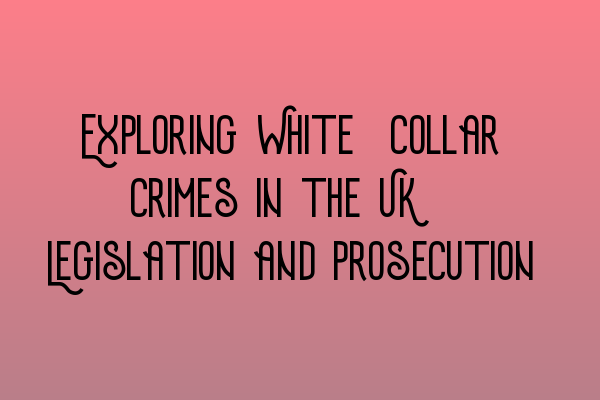Exploring White-Collar Crimes in the UK: Legislation and Prosecution
Welcome to the SQE Criminal Law & Practice blog! In this article, we will delve into the fascinating world of white-collar crimes in the UK, exploring the relevant legislation and the prosecution process. White-collar crimes, typically committed by individuals in professional or economic positions, have gained significant attention in recent years due to their impact on society and the economy.
Understanding White-Collar Crimes
Before delving into the legislation and prosecution, let’s first understand what white-collar crimes entail. White-collar crimes refer to non-violent offenses committed in the context of business or professional settings. These crimes often involve financial fraud, insider trading, bribery, money laundering, and embezzlement, among others.
Being well-versed in the laws and regulations surrounding white-collar crimes is crucial for legal professionals. Not only does it allow them to provide effective counsel to clients, but it also ensures fair and proper prosecution.
Legislation Governing White-Collar Crimes
In the UK, white-collar crimes are primarily governed by various legislative acts, including the Fraud Act 2006, the Bribery Act 2010, the Money Laundering Regulations 2017, and the Companies Act 2006, among others. These acts establish the legal framework for identifying, investigating, and prosecuting individuals involved in white-collar crimes.
The Fraud Act 2006, for instance, sets out offences related to fraud, false representation, and fraudulent trading. It provides a comprehensive definition of fraud and outlines the necessary elements for a successful prosecution. Familiarity with this act is essential for legal professionals dealing with white-collar crime cases.
The Bribery Act 2010, on the other hand, aims to combat bribery and corruption. It sets clear guidelines for individuals and organizations to prevent bribery and lays out criminal offences relating to bribery, both in the private and public sector. Understanding the provisions of this act is crucial when addressing cases involving bribery.
Additionally, the Money Laundering Regulations 2017 play a significant role in combating money laundering and terrorist financing. Legal professionals must be familiar with these regulations to identify potential money laundering activities and fulfill their obligations under the law.
The Prosecution Process
When it comes to the prosecution of white-collar crimes, the process involves several stages. It begins with the investigation conducted by law enforcement agencies such as the Serious Fraud Office (SFO) and the Financial Conduct Authority (FCA). These agencies work diligently to gather evidence, question suspects, and build a strong case.
Once the investigation is complete, the prosecution evaluates the evidence and determines whether to proceed with formal charges. If the decision to prosecute is made, the case moves to the court system. The prosecution presents its evidence, and the defense has the opportunity to challenge the allegations and present their case.
During the trial, legal professionals utilize their expertise in white-collar crime legislation to ensure a fair and just process. They engage in vigorous legal arguments, cross-examine witnesses, and analyze financial records to establish the guilt or innocence of the accused.
Conclusion
White-collar crimes pose a significant challenge for legal professionals due to their complex nature and the impact they have on society. Familiarity with the legislation surrounding white-collar crimes and understanding the prosecution process is essential for those practicing criminal law in the UK.
At SQE Criminal Law & Practice Law UK, we offer comprehensive preparation courses for the SQE 1 and SQE 2 exams, covering all relevant topics including white-collar crimes. To enhance your preparation, we recommend exploring our SQE 1 Practice Exam Questions, SQE 1 Practice Mocks FLK1 FLK2, and SQE 2 Preparation Courses. Stay updated with the latest SRA SQE Exam Dates to plan your exam schedule effectively.
